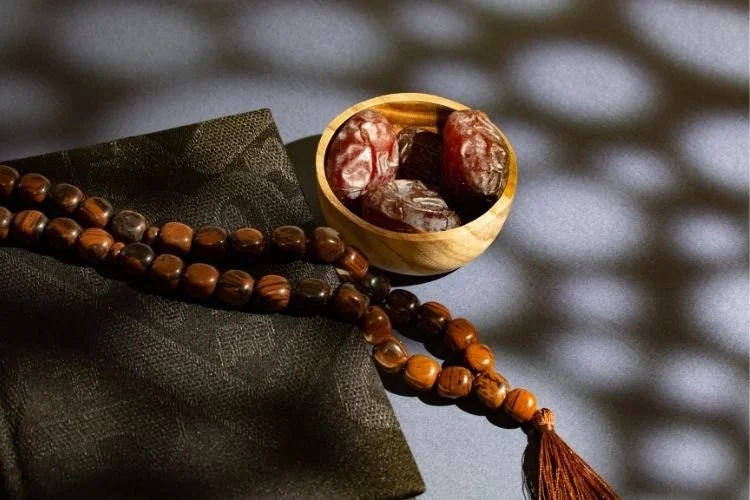RAMADAN IN THE UAE
TL;DR: Non-Muslims may eat and drink in public, some venues open on slightly different hours, and knafeh is morally compulsory.
Fasting, Community, and Kindness
If the term rings vague bells, here’s the primer: Ramadan is the 9th month of the Islamic calendar and 1 of the 5 pillars of Islam. It commemorates the Prophet Muhammad’s (PBUH) first Qur’anic revelation in 610 CE. Healthy, able Muslims who are fasting eat nothing, drink nothing (even water) and refrain from smoking between the pre-dawn fajr and sunset maghrib prayers. The fast is broken nightly with dates, water, and a communal meal called iftar.
Astronomers expect Ramadan 2026 to begin on 18 February 2026 (the official start is confirmed by the UAE moon-sighting committee the night before).
Daylight Etiquette for Non-Fasters
Eating & drinking
Cafés, restaurants, and beach clubs are open.
Eating/drinking outside is legal, but stepping indoors shows respect.
Kids can snack anywhere, any time.
Dress
Shoulders and knees covered in malls, mosques, and souks. Loose cotton > Lycra.
Greeting
“Ramadan Kareem” or “Ramadan Mubarak”. Smile first; let a fasting friend offer the handshake.
Opening Hours & Tourist Rhythm
Malls and theme parks are blissfully quiet(er) from morning to late afternoon, then thrum until 1 a.m. (sometimes 3 a.m.).
Museums and attractions tweak schedules. Some open later, others close just before iftar so staff can break the fast. Always check official sites or socials.
Roads & taxis empty after lunch, then jam around 5 p.m. as everyone heads home for iftar.
Where to Break Fast: Iftar & Suhoor Spots
Free communal iftars are offered in various mosques around the country. The Sheikh Zayed Grand Mosque in Abu Dhabi caters to 35,000 dinners daily with sectioned areas for families and solo diners.
When the cannon’s echo fades, servers glide in with bowls of dates and glasses of water and the city splits into two nocturnal acts. Iftar comes first: some venues unleash sprawling buffets where you orbit stations of mezze, lamb ouzi, and dessert pyramids; others keep things orderly with set multi-course menus that arrive like clockwork; a few let you stick to their usual à-la-carte lineup, same dishes, Ramadan-friendly portions. However you plate it, expect a complimentary round of qamar al-deen or jallab before you’ve even unfolded your napkin, and book early because sunset seats disappear fast.
A few hours later, kitchens reset for suhoor. Restaurants drop the lights, swap playlists for oud, and serve till 2 or 3 am., but the real magnet is the seasonal suhoor tent: a low-lit pavilion draped in fabrics where families sink into cushions, friends trade backgammon victories, and shisha coils through the air until sleep nudges everyone home.
Must-Try Ramadan Treats
Luqaimat: Crisp-on-the-outside dough balls, fried golden and drenched in sticky date syrup. Best eaten hot, ideally with syrup on your fingers.
Atayef: Bite-sized pancakes folded around cheese, clotted cream, or walnuts and drizzled with syrup.
Knafeh: A molten layer of stretchy white cheese hidden beneath a buttery, crisp nest of vermicelli.
Jallab: Rosewater and date molasses over crushed ice, topped with pine nuts.
Qamar al-Deen: Thick, velvety apricot nectar made from sun-dried fruit leather.
Frequently Asked Questions
Do tourists have to fast?
Not at all. Fasting is for those observing the month but being mindful of those who are is always appreciated.
Can I drink alcohol during Ramadan?
Licensed venues pour as usual. Just skip public drunkenness (that rule never sleeps).
Are beaches open?
Yes, beach access stays the same during Ramadan, whether you're sunbathing, swimming, or just walking the shore before iftar.
Final Word
Ramadan doesn’t close the UAE; it changes the rhythm. Sync your day to the sunset cannon, accept a free mosque meal, and bite into a late-night knafeh. You’ll fly home fuller, in every sense, than you arrived.


